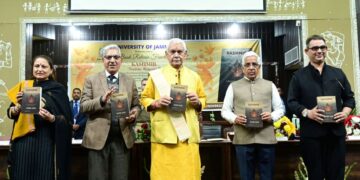Srinagar: Heated exchange between the couple or with any other family member does not constitute abetment to suicide and that the altercations in households cannot be construed as abnormal, the High Court of J&K and Ladakh has ruled in a 2009 suicide incident in Rajouri.
Justice M A Chowdhary while dismissing an appeal by the State against the accused Rakesh Kumar, husband of the deceased Sanjokta Kumari of village Khawas of Tehsil Kotranka in Rajouri held “heated exchange between the couple or with any other family member would not constitute an abetment so as to drive the deceased to take the extreme step of committing suicide. Such altercations do take place in every household and this cannot be construed as an abnormal step so as to constitute the abetment of an offence of committing suicide”.
The State had filed the appeal against a 2015 Principal Sessions Court judgment whereby the accused had been acquitted of the charges under section 306 RPC (abetment of suicide).
The State argued that the order of the Sessions Court is against the law and facts, and that there is sufficient material on record to convict the accused (respondents).
The factual background of the case, according to the judgment, is that on May 1, 2009, the Police Station Budhal received information that Sanjokta Kumari, wife of Rakesh Sharma, had consumed some poisonous medicines at her village and had been referred to District Hospital, Rajouri.
A police team proceeded towards Rajouri. However, en-route they found the heirs of Kumari were taking back her dead body. The custody of the dead body was taken over by the police and it was taken to Kandi Hospital for post-mortem. Later on the dead body of the deceased was handed over to her heirs for last rites.
The police visited the place of occurrence and a site plan was prepared. During the investigation, statements of the witnesses were recorded. The police came to find that since marriage, the accused Rakesh Kumar (husband) and Harbans Lal (brother-in-law of the deceased) had harassed her.
“They demanded dowry from her and also used to taunt her for not bringing dowry and for not being a good cook,” said the police, adding that the deceased “bearing the cruelty” used to narrate it to her parents, who tried to correct the behaviour of the accused but all in vain.
It stated that on Mayday of 2009, the father-in-law of the deceased had organized ‘Ramayan Paath’ at his home. Besides Pandit, many villagers also participated in the Paath.
Kumari was busy preparing food in the kitchen when her husband and brother-in-law scolded her angrily for not having prepared the food as yet. Kumari told them that in case they wanted the food to be prepared immediately, they themselves could prepare it.
The accused duo snatched the flour from the hands of Kumari, pushed her out of the kitchen. They asked her to go away, saying they “did not want such a dirty girl”.
Unable to tolerate the acts of the duo, she committed suicide in her room by consuming some insecticide.
Based on the enquiry conducted, a case was registered. Offence punishable under section 306 RPC against both the accused was cited in the First Information Report.
A charge-sheet was presented in the trial court. On appreciation of the evidence and hearing arguments from both sides, it dismissed the charge-sheet. Both the accused were acquitted of the charges of the offence punishable under section 306 RPC, an offense that could have led to the imprisonment of the accused for a term extendable to ten years besides fine.
While disposing of the appeal against the sessions court acquittal of the accused, Justice Chowdhary said “there is admittedly no eye-witness to the commission of the offence to depose that the deceased had been instigated, coerced or abetted to take poison in his/her presence to commit suicide so as to prove by direct evidence that the deceased had committed offence after having been abetted by any of the accused”.
The whole of the case of the prosecution is based on circumstantial evidence, he said.
The judge held that Dev Raj Sharma, Neelam Devi and Pawan Sharma, parents and siblings of the deceased, made incriminating evidence with general statements of cruelty against the accused.
The bench asked as to “why the trio had not reported the matter to any community panchayat for resolution or to the police for legal action in the matter. The allegations of the demand of dowry have also not been amply proved, it said.
The trial court has very elaborately discussed the prosecution evidence and has drawn a satisfaction so as to form an opinion that the accused were not involved in the commission of any offence punishable under section 306 RPC, concluded the bench.







